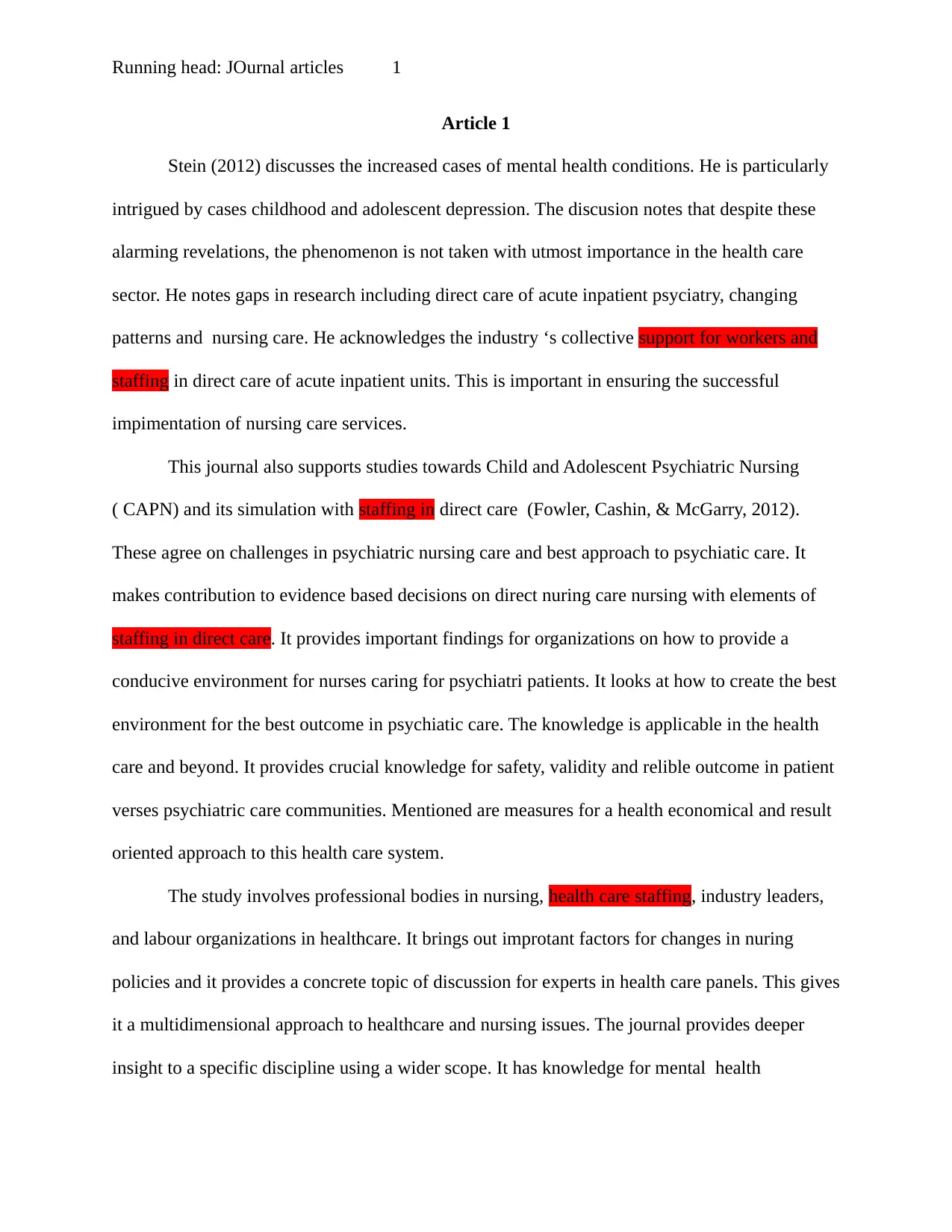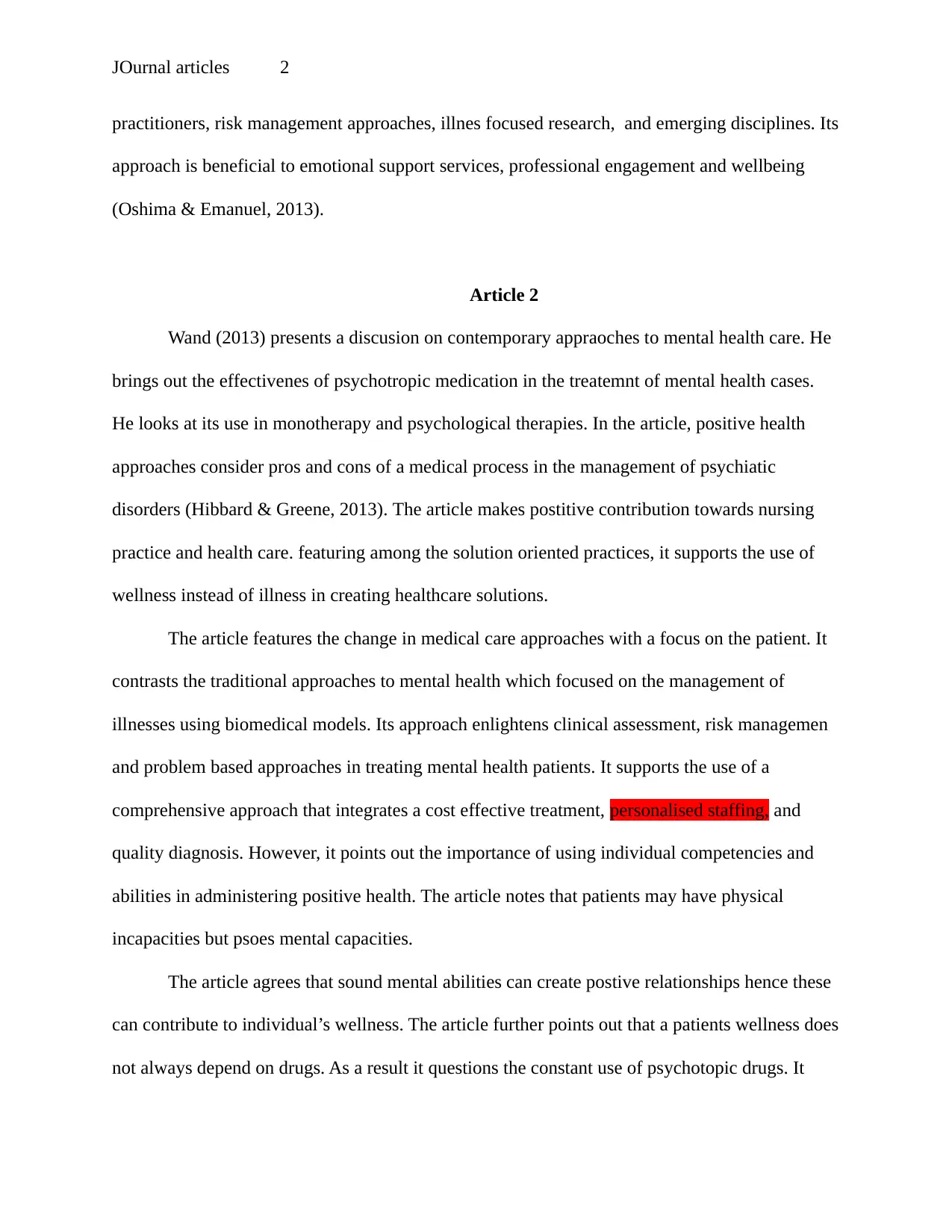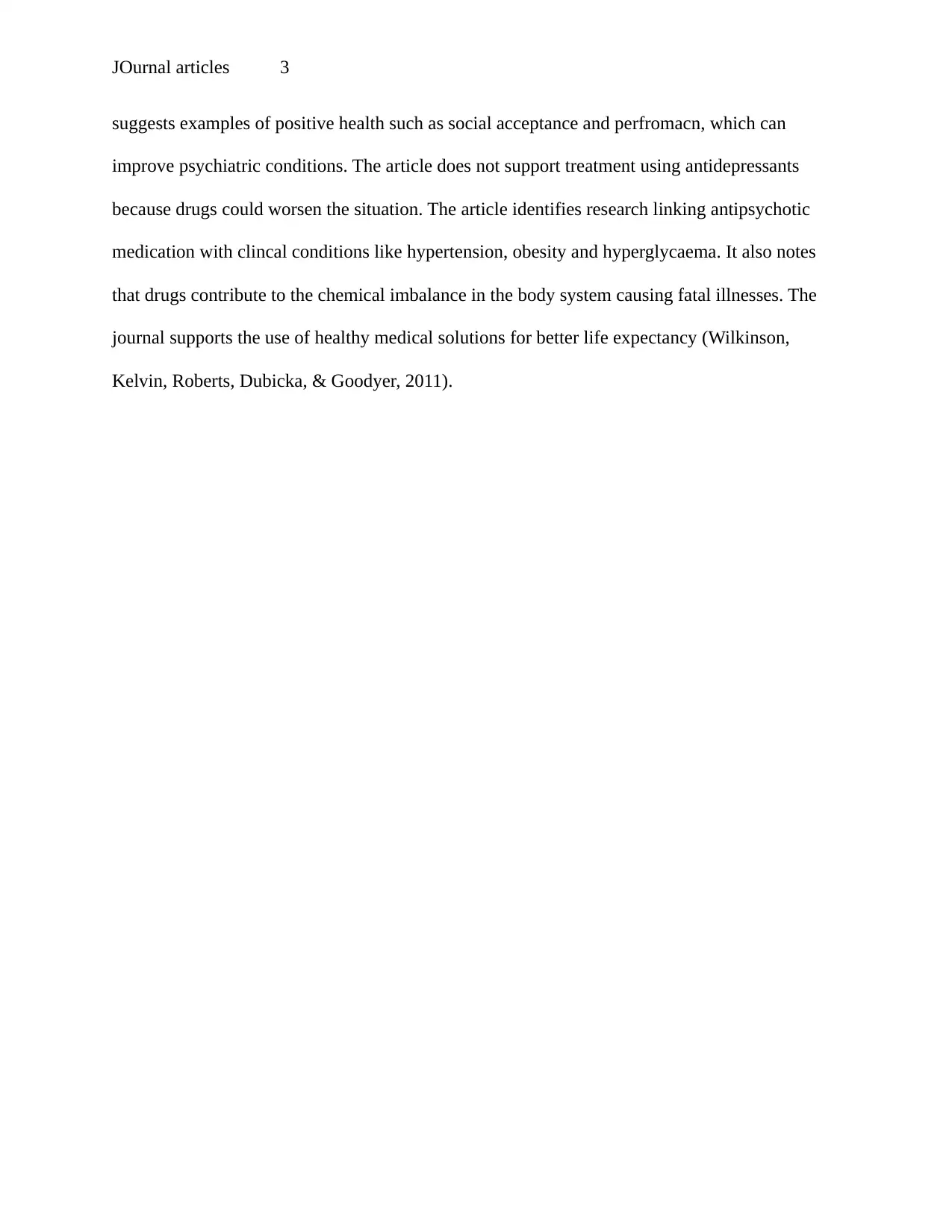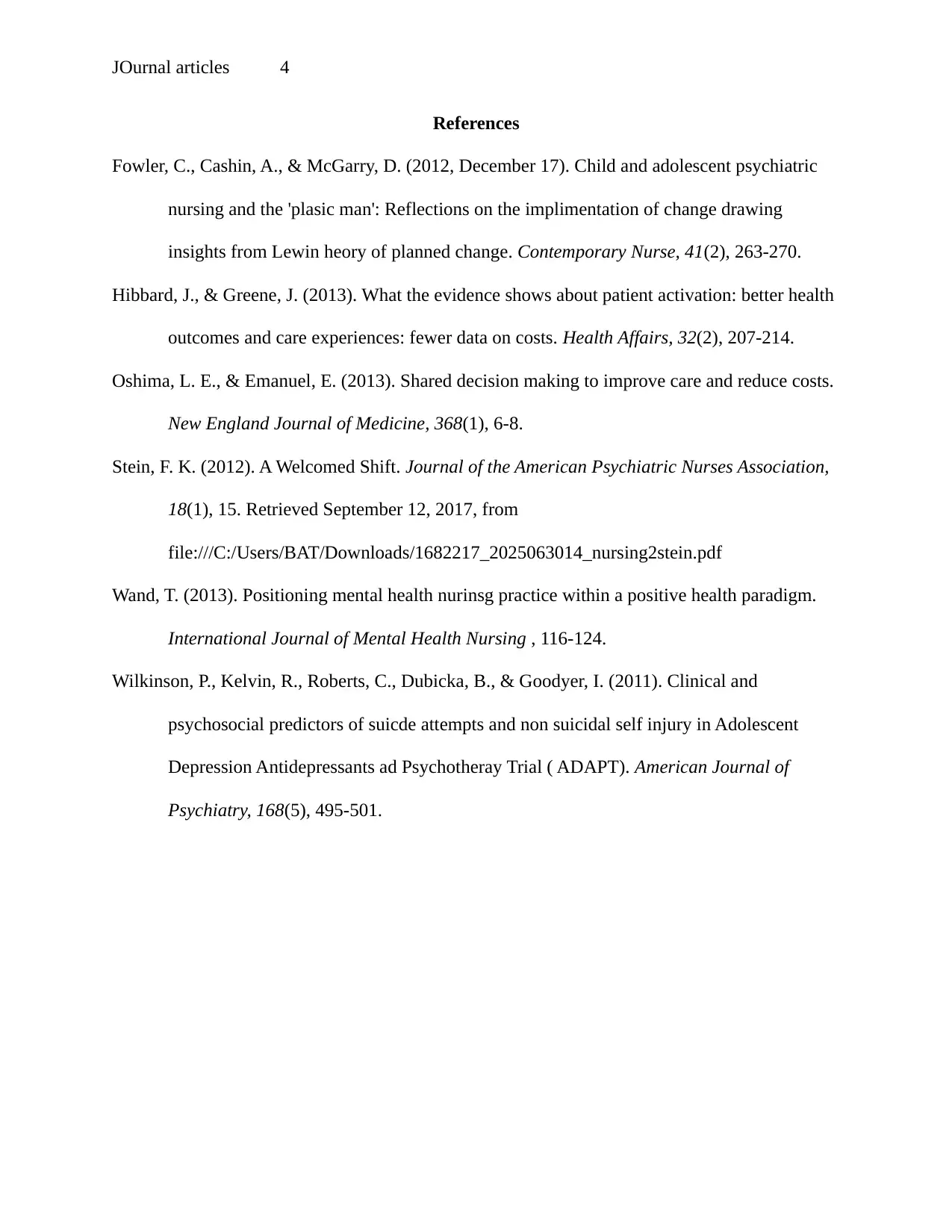Contemporary Approaches to Mental Health Care: Journal Articles
VerifiedAdded on 2020/03/28
|4
|992
|112
Report
AI Summary
This report analyzes two journal articles related to mental health care. The first article, by Stein (2012), discusses the increasing prevalence of mental health conditions, particularly in childhood and adolescence, and highlights the need for improved healthcare sector attention and research. It emphasizes the importance of nursing care, child and adolescent psychiatric nursing (CAPN), and creating a supportive environment for psychiatric patients. The second article, by Wand (2013), explores contemporary approaches to mental health care, including the use of psychotropic medication and positive health paradigms. It contrasts traditional illness-focused approaches with wellness-focused strategies, highlighting the importance of individualized treatment, patient competencies, and the potential limitations of drug-based interventions. The analysis provides insights into evidence-based practices, risk management, and the evolving landscape of mental health care, with references to related studies.

Running head: JOurnal articles 1
Article 1
Stein (2012) discusses the increased cases of mental health conditions. He is particularly
intrigued by cases childhood and adolescent depression. The discusion notes that despite these
alarming revelations, the phenomenon is not taken with utmost importance in the health care
sector. He notes gaps in research including direct care of acute inpatient psyciatry, changing
patterns and nursing care. He acknowledges the industry ‘s collective support for workers and
staffing in direct care of acute inpatient units. This is important in ensuring the successful
impimentation of nursing care services.
This journal also supports studies towards Child and Adolescent Psychiatric Nursing
( CAPN) and its simulation with staffing in direct care (Fowler, Cashin, & McGarry, 2012).
These agree on challenges in psychiatric nursing care and best approach to psychiatic care. It
makes contribution to evidence based decisions on direct nuring care nursing with elements of
staffing in direct care. It provides important findings for organizations on how to provide a
conducive environment for nurses caring for psychiatri patients. It looks at how to create the best
environment for the best outcome in psychiatic care. The knowledge is applicable in the health
care and beyond. It provides crucial knowledge for safety, validity and relible outcome in patient
verses psychiatric care communities. Mentioned are measures for a health economical and result
oriented approach to this health care system.
The study involves professional bodies in nursing, health care staffing, industry leaders,
and labour organizations in healthcare. It brings out improtant factors for changes in nuring
policies and it provides a concrete topic of discussion for experts in health care panels. This gives
it a multidimensional approach to healthcare and nursing issues. The journal provides deeper
insight to a specific discipline using a wider scope. It has knowledge for mental health
Article 1
Stein (2012) discusses the increased cases of mental health conditions. He is particularly
intrigued by cases childhood and adolescent depression. The discusion notes that despite these
alarming revelations, the phenomenon is not taken with utmost importance in the health care
sector. He notes gaps in research including direct care of acute inpatient psyciatry, changing
patterns and nursing care. He acknowledges the industry ‘s collective support for workers and
staffing in direct care of acute inpatient units. This is important in ensuring the successful
impimentation of nursing care services.
This journal also supports studies towards Child and Adolescent Psychiatric Nursing
( CAPN) and its simulation with staffing in direct care (Fowler, Cashin, & McGarry, 2012).
These agree on challenges in psychiatric nursing care and best approach to psychiatic care. It
makes contribution to evidence based decisions on direct nuring care nursing with elements of
staffing in direct care. It provides important findings for organizations on how to provide a
conducive environment for nurses caring for psychiatri patients. It looks at how to create the best
environment for the best outcome in psychiatic care. The knowledge is applicable in the health
care and beyond. It provides crucial knowledge for safety, validity and relible outcome in patient
verses psychiatric care communities. Mentioned are measures for a health economical and result
oriented approach to this health care system.
The study involves professional bodies in nursing, health care staffing, industry leaders,
and labour organizations in healthcare. It brings out improtant factors for changes in nuring
policies and it provides a concrete topic of discussion for experts in health care panels. This gives
it a multidimensional approach to healthcare and nursing issues. The journal provides deeper
insight to a specific discipline using a wider scope. It has knowledge for mental health
Paraphrase This Document
Need a fresh take? Get an instant paraphrase of this document with our AI Paraphraser

JOurnal articles 2
practitioners, risk management approaches, illnes focused research, and emerging disciplines. Its
approach is beneficial to emotional support services, professional engagement and wellbeing
(Oshima & Emanuel, 2013).
Article 2
Wand (2013) presents a discusion on contemporary appraoches to mental health care. He
brings out the effectivenes of psychotropic medication in the treatemnt of mental health cases.
He looks at its use in monotherapy and psychological therapies. In the article, positive health
approaches consider pros and cons of a medical process in the management of psychiatic
disorders (Hibbard & Greene, 2013). The article makes postitive contribution towards nursing
practice and health care. featuring among the solution oriented practices, it supports the use of
wellness instead of illness in creating healthcare solutions.
The article features the change in medical care approaches with a focus on the patient. It
contrasts the traditional approaches to mental health which focused on the management of
illnesses using biomedical models. Its approach enlightens clinical assessment, risk managemen
and problem based approaches in treating mental health patients. It supports the use of a
comprehensive approach that integrates a cost effective treatment, personalised staffing, and
quality diagnosis. However, it points out the importance of using individual competencies and
abilities in administering positive health. The article notes that patients may have physical
incapacities but psoes mental capacities.
The article agrees that sound mental abilities can create postive relationships hence these
can contribute to individual’s wellness. The article further points out that a patients wellness does
not always depend on drugs. As a result it questions the constant use of psychotopic drugs. It
practitioners, risk management approaches, illnes focused research, and emerging disciplines. Its
approach is beneficial to emotional support services, professional engagement and wellbeing
(Oshima & Emanuel, 2013).
Article 2
Wand (2013) presents a discusion on contemporary appraoches to mental health care. He
brings out the effectivenes of psychotropic medication in the treatemnt of mental health cases.
He looks at its use in monotherapy and psychological therapies. In the article, positive health
approaches consider pros and cons of a medical process in the management of psychiatic
disorders (Hibbard & Greene, 2013). The article makes postitive contribution towards nursing
practice and health care. featuring among the solution oriented practices, it supports the use of
wellness instead of illness in creating healthcare solutions.
The article features the change in medical care approaches with a focus on the patient. It
contrasts the traditional approaches to mental health which focused on the management of
illnesses using biomedical models. Its approach enlightens clinical assessment, risk managemen
and problem based approaches in treating mental health patients. It supports the use of a
comprehensive approach that integrates a cost effective treatment, personalised staffing, and
quality diagnosis. However, it points out the importance of using individual competencies and
abilities in administering positive health. The article notes that patients may have physical
incapacities but psoes mental capacities.
The article agrees that sound mental abilities can create postive relationships hence these
can contribute to individual’s wellness. The article further points out that a patients wellness does
not always depend on drugs. As a result it questions the constant use of psychotopic drugs. It

JOurnal articles 3
suggests examples of positive health such as social acceptance and perfromacn, which can
improve psychiatric conditions. The article does not support treatment using antidepressants
because drugs could worsen the situation. The article identifies research linking antipsychotic
medication with clincal conditions like hypertension, obesity and hyperglycaema. It also notes
that drugs contribute to the chemical imbalance in the body system causing fatal illnesses. The
journal supports the use of healthy medical solutions for better life expectancy (Wilkinson,
Kelvin, Roberts, Dubicka, & Goodyer, 2011).
suggests examples of positive health such as social acceptance and perfromacn, which can
improve psychiatric conditions. The article does not support treatment using antidepressants
because drugs could worsen the situation. The article identifies research linking antipsychotic
medication with clincal conditions like hypertension, obesity and hyperglycaema. It also notes
that drugs contribute to the chemical imbalance in the body system causing fatal illnesses. The
journal supports the use of healthy medical solutions for better life expectancy (Wilkinson,
Kelvin, Roberts, Dubicka, & Goodyer, 2011).
⊘ This is a preview!⊘
Do you want full access?
Subscribe today to unlock all pages.

Trusted by 1+ million students worldwide

JOurnal articles 4
References
Fowler, C., Cashin, A., & McGarry, D. (2012, December 17). Child and adolescent psychiatric
nursing and the 'plasic man': Reflections on the implimentation of change drawing
insights from Lewin heory of planned change. Contemporary Nurse, 41(2), 263-270.
Hibbard, J., & Greene, J. (2013). What the evidence shows about patient activation: better health
outcomes and care experiences: fewer data on costs. Health Affairs, 32(2), 207-214.
Oshima, L. E., & Emanuel, E. (2013). Shared decision making to improve care and reduce costs.
New England Journal of Medicine, 368(1), 6-8.
Stein, F. K. (2012). A Welcomed Shift. Journal of the American Psychiatric Nurses Association,
18(1), 15. Retrieved September 12, 2017, from
file:///C:/Users/BAT/Downloads/1682217_2025063014_nursing2stein.pdf
Wand, T. (2013). Positioning mental health nurinsg practice within a positive health paradigm.
International Journal of Mental Health Nursing , 116-124.
Wilkinson, P., Kelvin, R., Roberts, C., Dubicka, B., & Goodyer, I. (2011). Clinical and
psychosocial predictors of suicde attempts and non suicidal self injury in Adolescent
Depression Antidepressants ad Psychotheray Trial ( ADAPT). American Journal of
Psychiatry, 168(5), 495-501.
References
Fowler, C., Cashin, A., & McGarry, D. (2012, December 17). Child and adolescent psychiatric
nursing and the 'plasic man': Reflections on the implimentation of change drawing
insights from Lewin heory of planned change. Contemporary Nurse, 41(2), 263-270.
Hibbard, J., & Greene, J. (2013). What the evidence shows about patient activation: better health
outcomes and care experiences: fewer data on costs. Health Affairs, 32(2), 207-214.
Oshima, L. E., & Emanuel, E. (2013). Shared decision making to improve care and reduce costs.
New England Journal of Medicine, 368(1), 6-8.
Stein, F. K. (2012). A Welcomed Shift. Journal of the American Psychiatric Nurses Association,
18(1), 15. Retrieved September 12, 2017, from
file:///C:/Users/BAT/Downloads/1682217_2025063014_nursing2stein.pdf
Wand, T. (2013). Positioning mental health nurinsg practice within a positive health paradigm.
International Journal of Mental Health Nursing , 116-124.
Wilkinson, P., Kelvin, R., Roberts, C., Dubicka, B., & Goodyer, I. (2011). Clinical and
psychosocial predictors of suicde attempts and non suicidal self injury in Adolescent
Depression Antidepressants ad Psychotheray Trial ( ADAPT). American Journal of
Psychiatry, 168(5), 495-501.
1 out of 4
Related Documents
Your All-in-One AI-Powered Toolkit for Academic Success.
+13062052269
info@desklib.com
Available 24*7 on WhatsApp / Email
![[object Object]](/_next/static/media/star-bottom.7253800d.svg)
Unlock your academic potential
Copyright © 2020–2026 A2Z Services. All Rights Reserved. Developed and managed by ZUCOL.




